|
Absolutely was a comedy sketch show that ran for four short seasons on Channel Four from 1989 to 1993, and to my knowledge has never been repeated once. I stumbled into it midway through series 3 and stayed with it until its final curtain. I wasn't a hardcore fan and remained curiously unamused by some of the characters that have found a small place in the comedy hall of fame, but was still entertained by material that I was able to recall many years later in some considerable detail without being able to pinpoint its source. One character in particular drove me nuts trying to track down, one whose short but impossibly catchy scenes I wrongly traced back to series 1 of The Fast Show. As soon as I reaquainted myself with the cast of Absolutely, I knew I'd found my man. More on him later.
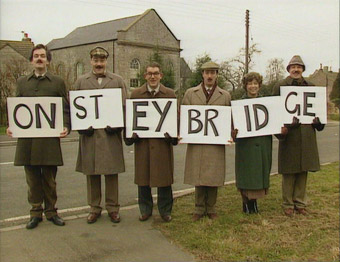
Absolutely was a largely Scottish affair, or at least gave the impression of being so, being written and performed by Peter Baikie, Jack Docherty, Moray Hunter, Gordon Kennedy, Morwenna Banks and John Sparkes. As with other such shows that followed in its wake, a number of recurring characters were soon established, their sketches alternating with one-offs and even the odd comedy musical number, where live action was combined with a kind of child-like animation to splendidly grotesque effect. Looking back on it, series 1 does occasionally feel like a programme still finding its feet, with sketches sometimes running for longer than the material can sustain, overextending jokes and making the routines that don't hit home feel like something of a haul. It still has its golden moments, though, my favourites including the femme fatale who seductively advises the female audience on how to kill their husbands, and a nicely scripted song about being a 'normal guy' (whose consistency of tone makes lines like "I'll never be an astronaut standing on Jupiter – I'll never find a word that rhymes with Jupiter" sound funnier than they read), while a neat gag about an upcoming ad break will be lost on an audience too young to remember those stripey indicators in the corner of the screen. Series 2 has a decidedly snappier feel from the off, with briefer sketches that dovetail into each other in absurdist fashion. It set the style for most of the shows that followed, although the surreal links were soon dropped after they effectively straight-jacketed the editing process.
Retrospectively revisiting all four series in a continuous stream did serve to re-affirm my original relationship with the show, whose devoted following will doubtless completely disagree with my indifference to characters that they hold dear, as indeed they should. I'll openly admit that my reasons are personal, as many such prejudices so often are, but on the list of those I never connected with are such signature characters as the little girl with kiddy explanations for a whole range of adult activities (my intense dislike of real children of this sort may be a key reason here), the pig-ugly Welsh couple with a penchant for bad DIY, the high-voiced Stoneybridge town council, and the horribly upright Nice Family, although all four still have their moments (the Soneybridge crew's refusal to recognise the throne is a terrific gag). There's also the sense that the elderly Bert is being used to poke fun at old people just for being slow and infirm, but he does prefigure a very similar character in the later Fast Show, where Bert's catch-word "Arse!" was transformed into "Oh, bugger!"
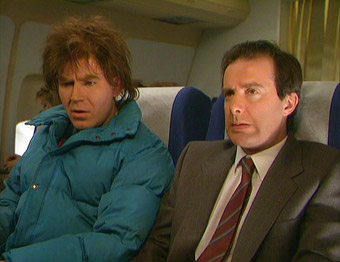
But in revisiting the show, I really warmed to many of the other regulars, particularly as we moved into series 2 and beyond. The middle-class English couple who are bemused by the work and products of the charity organisations they have subscribed to are wickedly accurate parodies, while the anorak-clad, nightmarishly persistent Calham Gilhooney is an extraordinary comedy creation, a man you'd walk on burning spikes to avoid spending an afternoon with but whose unbroken stream of inane prattle makes for compelling and often hilarious entertainment (scenes in which he tries to buy a plane ticket, drives a fellow air passenger bonkers and confuses the titles of borrowed videos with their return dates are particularly funny). A few brief appearances in series four was all it took to make a fan favourite out of a Pavarotti-like Laughing Man, who dissolves into convulsions of opera-sung hilarity at witless gags (would-be jokey bumper stickers, pub signs and the like), while the furious outbursts of English-hating Scotsman McGlashan are given an edge when you realise that some of the time he may have a point.
One of my absolute favourites and the character I spent so long trying to track down is Peter Baikie's impossibly self-satisfied, Richard Stilgoe-esque pianist, who jauntily plonks out songs about being "frightfully clever" and the fact that he can do "anything anything anything" without breaking his smug grin for a second. In a particularly exuberant performance he plays for a restaurant audience at the same time as preparing a meal, and on another occasion while simultaneously heading passing footballs, tossing pancakes and miraculously curing the infirm.
The wild cards in the regular character pack are Don and George, a flat-sharing pair whose personalities, intelligence levels and even relationship to each other appear to shift from episode to episode. Their first season sketches are engaging, particularly in retrospect, but it's in the second series that they come into their own, with their first episode trip to a furnishing store giving rise to a handful of inspired gags ("have you got the same wallpaper, but further away?"), while a one-joke sketch in series four in which George simply cannot understand the concept of Don going to work is made painfully funny by the pair's increasingly exaggerated incredulity.
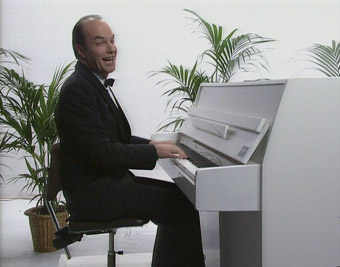
Increasingly, it was the one-off sketches that I looked forward to the most, ones in which characters are created purely to serve the material. Although as uneven as the recurring character routines, the best of these are inspired enough to justify the purchase of this disc set alone. A sense of the surreal runs throughout, with the humour ranging from slightly off-the-wall behaviour to whole routines of gleefully Python-esque absurdity: characters break off from the action to talk directly to camera and question the actions of others in the scene; the Queen inspects the palace guard by grabbing them individually by the balls; court officials – judge included – join a trial witness in a game of 'guess the gargled TV theme tune'; a garage customer is unable to find out what's wrong with his car from a series of bemused mechanics, and when an explanation is forthcoming, is unable to grasp even the simplest details; participants in a business meeting bring in stunt doubles to drive home their arguments; a businessman who sponsors an art exhibition is terrorised by the peculiar behaviour of the exhibitors; a pair of proud parents outline how their son has raised almost a million pounds for charity despite being dead; and in a moment of genuine comic inspiration, we are treated to a professional golf match between Thor and a cyberman from Dr. Who, a sketch that then loses its edge with the subsequent introduction of other, less amusing characters.
Many of the most memorable sketches owe their success to their performance. There are too many to list here, but I'll give an affectionate special mention to Gordon Kennedy's terrible, field-prancing poet and Morwena Banks' young middle-class trendy writing a break-up letter, while the sketch that made me laugh the hardest and longest has Jack Docherty and John Sparkes leaning into the camera to angrily proclaim the importance of hair partings. Middle class conventions get their fair share of digs, as do people in positions of nominal power (bank tellers, immigration officers and a company commissionaire whose name appears to be the whistling noise he uses to give directions). In series 2, children became a brief and frankly welcome target, with a little girl bluntly told that her painting skills are rubbish and adults encouraged to involve kids in their leisure time by using them as golf clubs, tennis rackets and wheelbarrows. Just occasionally there's the sense that a sketch has been staged just so that the team can get something off their chest, as with the short but effective dismissal of the idea of babies as cute, the questioning of the use of the term World Series for a competition comprised only of American and Canadian teams, an order for pizza that includes requests for all the things that the company will get wrong, and the particularly witty mocking of street corner religious evangelists. And let's not forget the musical numbers, which amusingly ponder on the importance of such things as wearing a suit or having sensible hair, celebrate the joys of bank holidays or packed lunches, or in a rare example of straight parody, take the flaming piss out of the video for Simple Minds' Belfast Child.
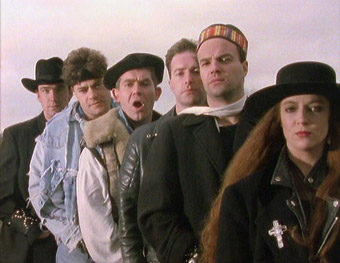
In spite of my failure to engage with some of the most popular characters, watching all four series of Absolutely and a disc full of extras over a period of two weeks has proved an addictive, enjoyable and dangerously distracting experience. It's put me behind on other reviews and interfered with what's left of my social life, but I felt no urge to skip through the discs for the sake of speed. Almost twenty years on, Absolutely remains an imaginative, nicely bizarre and often very funny showcase for six hugely talented performers whose faces will probably be more familiar to many than their names, despite their collective work since. Uneven it may be, but there's still more than enough great stuff here to make this belated release something to celebrate,
Transferred in the original 4:3 aspect ratio from what I assume were the studio tape masters, the picture quality is consistently good, the sharpness, colour and contrast all impressive within the slight limitations imposed by the recording medium of the time.
The Dolby 2.0 stereo soundtrack is clean and clear with a decent dynamic range, certainly way better than the season one extracts included in the extra features, which appear to have been hauled off of linear sound VHS.
The lack of subtitles is occasionally a shame, usually when lyrics of a song are lost behind audience laughter. The hearing impaired will have more to complain about here.
Audio Commentaries
There are audio commentaries by all six of the regular cast on eight episodes (for the record, they are series 1 episodes 1 and 6, series 2 episodes 1 and 8, series 3 episodes 1 and 2, and series 4 episodes 1 and 6). These are all lively with recollective chat and occasionally so busy that you'll find yourself trying to listen to one conversation as it battles for attention with up to two others taking place simultaneously, and now and then an interesting story is cut short when interrupted by a recollection from someone louder. When things are clear, though, there's plenty of enjoyable background detail on the production, and some of the anecdotes are priceless. They're clearly having fun watching themselves work and every now and again end up laughing along with the audience.
Video Commentaries
For each of the audio commentaries there is also a video of the same, which takes the form of a small box that appears in the bottom right of the screen in which you can watch the cast recording their commentaries. I genuinely couldn't see any value in this, as what you get is a static wide shot of the cast sitting round a table wearing headphones in front of their respective monitors, half with their back to you, the other half obscured by the monitors and all too small on screen to clearly see any facial expressions when you do get a glimpse. The video vanishes halfway through the commentary on series 2, episode 3. I didn't miss it.
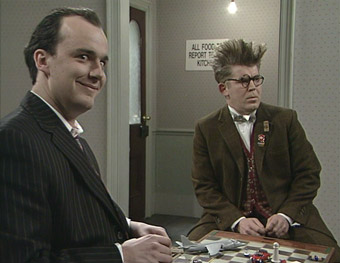
The rest of the extras are all located on disc 8.
Pilot Episode (38:18)
The episode that was used to sell the series to Channel Four kicks off in the same manner as the first episode of series 1, but soon diverges to include sketches that did not appear until later in the series and a couple that were never re-used, including a song number in which a research scientist manically justifies his experiments on animals. Rescued from what looks like low-band tape, it includes a few instances of tape damage but is otherwise in surprisingly good shape.
Absolute Beginnings (19:02)
A look back at how the Absolutely team came together, employing archive footage of anyone who could be mistaken for them as children and some welcome and genuine footage of Docherty, Baikie, Kennedy and Hunter as The Bodgers performing Macbeth at the Edinburgh Fringe. There's also an interview with producer Alan Nixon, extracts from The Bodgers radio series, John Sparkes performing an early version of his twitchy Welshman, and an extended comedy textual ending. Made by the cast themselves, it's technically wobbly, with squeezed up anamorphic and sideways stretched footage cut with material in the correct aspect ratio.
Absolutely Remembered (16:34)
A few famous faces who were fans of the show – namely Paul Whitehouse, Ian Hislop, David Baddiel, Jo Brand, Sanjeev Kohli and Hardeep Singh Kohli – recall what was great about it, what didn't work so well, which bits they liked the most and its influence on subsequent shows of its ilk. The Kohli brothers are particularly passionate fans, with Hardeep claiming that the show was funnier than Monty Python – something I'd certainly disagree with – and that if Absolutely had been made first then Python would be known as Absolutely-esque rather than the reverse, which ignores the fact that had Python not done what they did when they did then Absolutely may never have happened. Using the same logic, after all, you could claim that if things had worked out differently then Hitchcock might be regarded as De Palma-esque. Perish the thought. An enjoyable piece nonetheless, with similar technical issues to the above, though you can add iffy sound recording to the rap sheet here.
Character Guides (50:10)
Just about the best extra here takes a detailed and revealing look at the creation and background to many of the series' recurring characters, as told by those who wrote and played them. They can be played individually but it's worth watching as one (or rather two as it's organised here) continuous piece. The same technical issue above also apply here.
Songs and Animation (7:01)
A short but very enjoyable look at problems of creating and shooting comedy musical interludes with a brief bit on the series animators, Triffic Films.
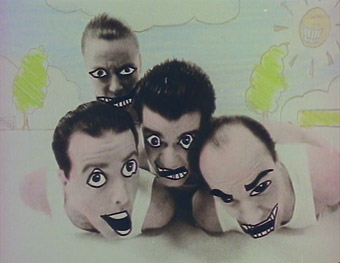
Absolutely Other Things (22:58)
A round-up of loose ends from the interview material, including the drinking that used to take place on the night before recording, the rules the cast set for themselves for the series and how quickly they were broken, the writing of the show, John Sparkes' scene stealing and Jack Docherty's improvisations. It's labelled "for die-hard fans only" but there's amusing stuff here for even the casual viewer.
Photo Gallery (2:20)
A rolling slideshow of publicity materials, backstage stills and the like.
OK, it may not all work for me, but that's just me, and even with that caveat I'm still wholeheartedly recommending this box set. If you're already a fan of the series then this is a dream come true and lives up to its completist title – all of the episodes, including the pilot, and a bucketload of extra features. Surreal, imaginative and often very damned funny, this is definitely one for your TV comedy collection.
|